外研版高一英语必修4 Mmodule 1 Life in the future Listening and Speaking 课件(共26张PPT)
文档属性
| 名称 | 外研版高一英语必修4 Mmodule 1 Life in the future Listening and Speaking 课件(共26张PPT) |
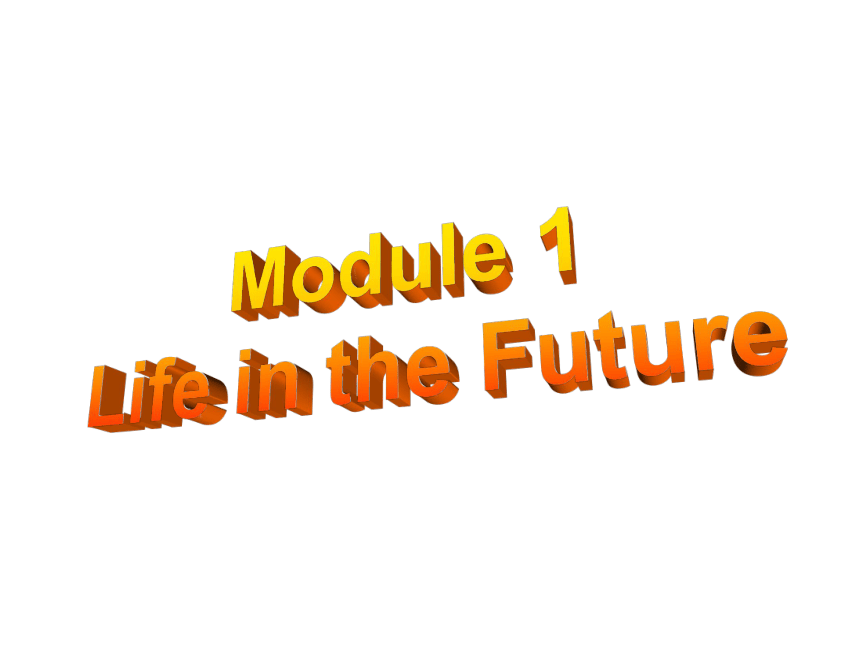
|
|
| 格式 | zip | ||
| 文件大小 | 357.4KB | ||
| 资源类型 | 教案 | ||
| 版本资源 | 外研版 | ||
| 科目 | 英语 | ||
| 更新时间 | 2019-05-01 00:00:00 | ||
图片预览


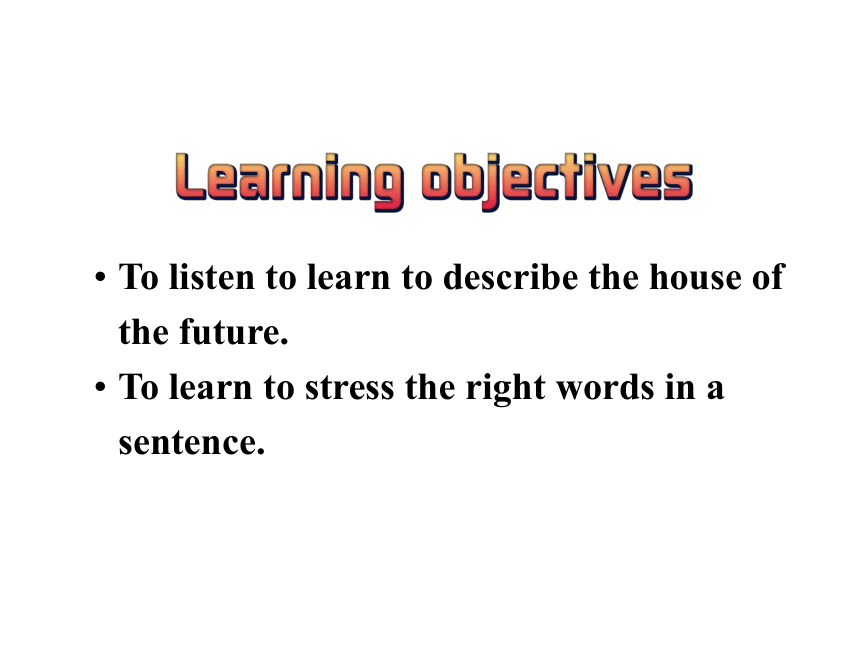
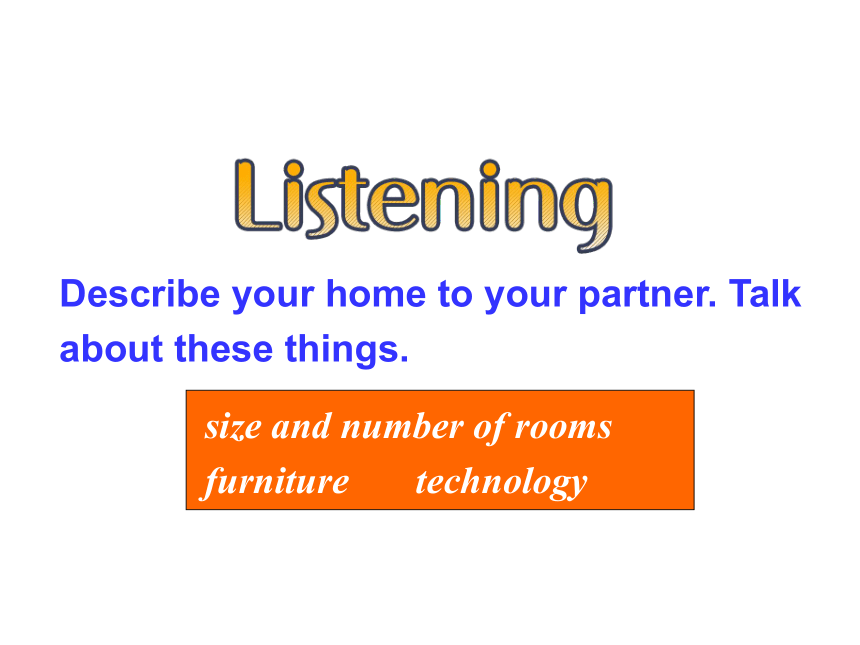
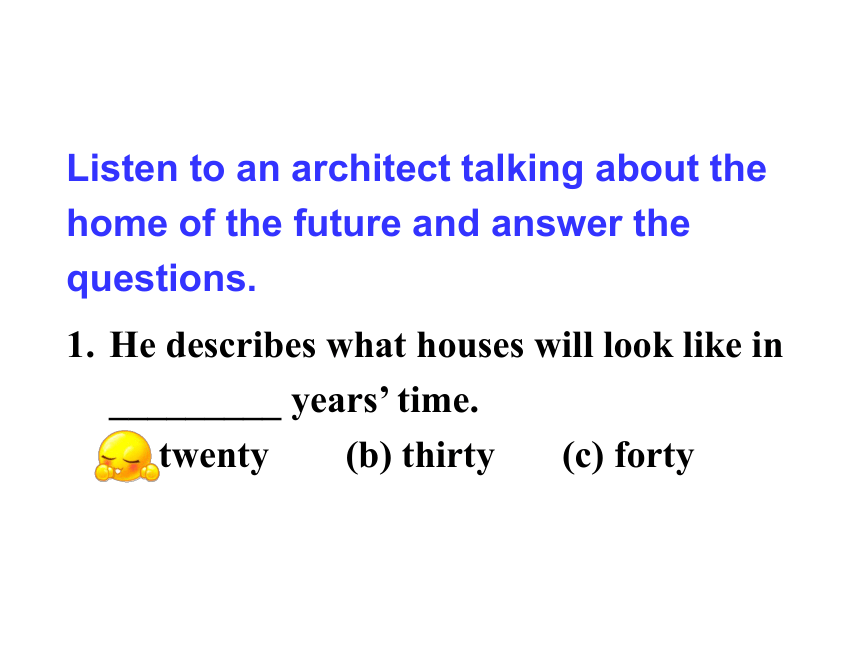
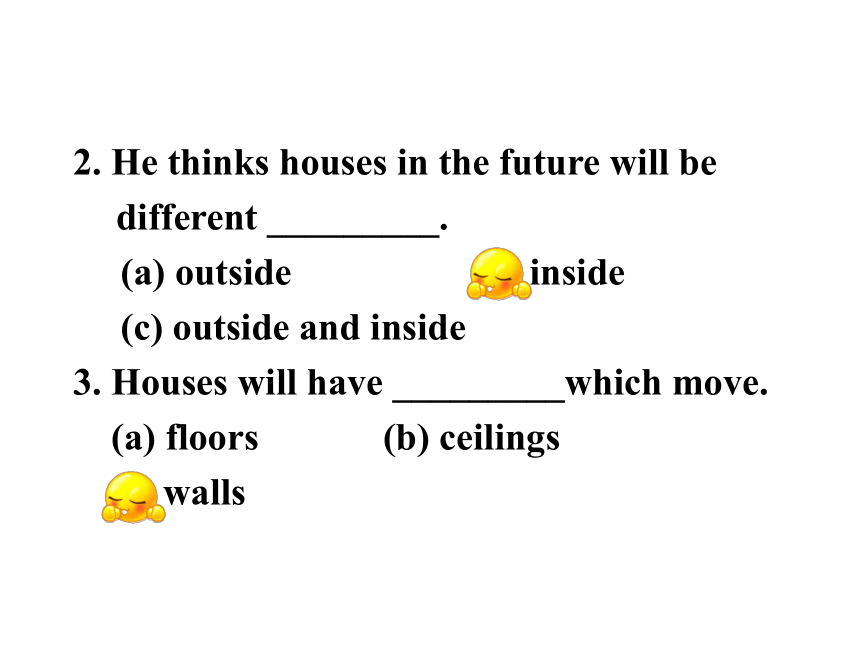
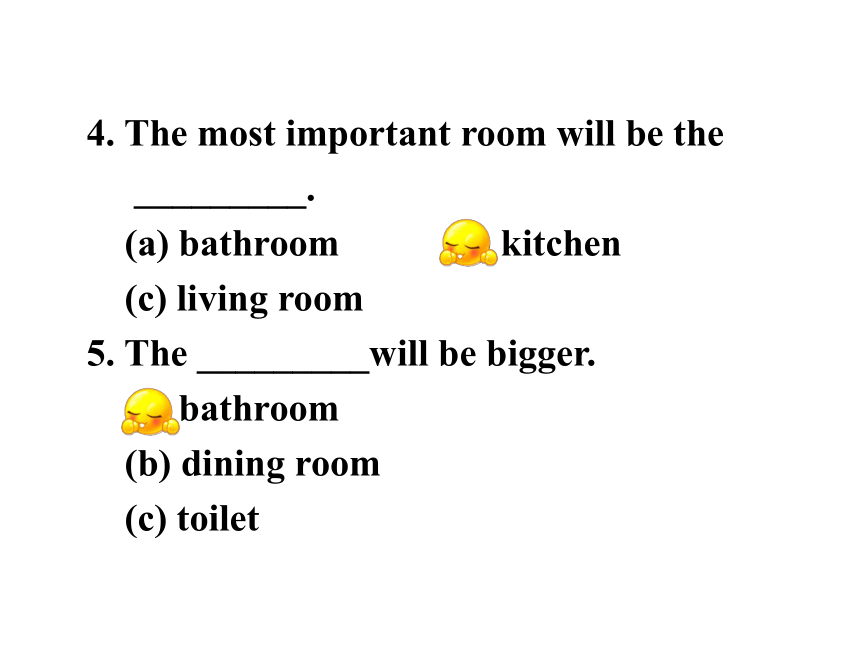
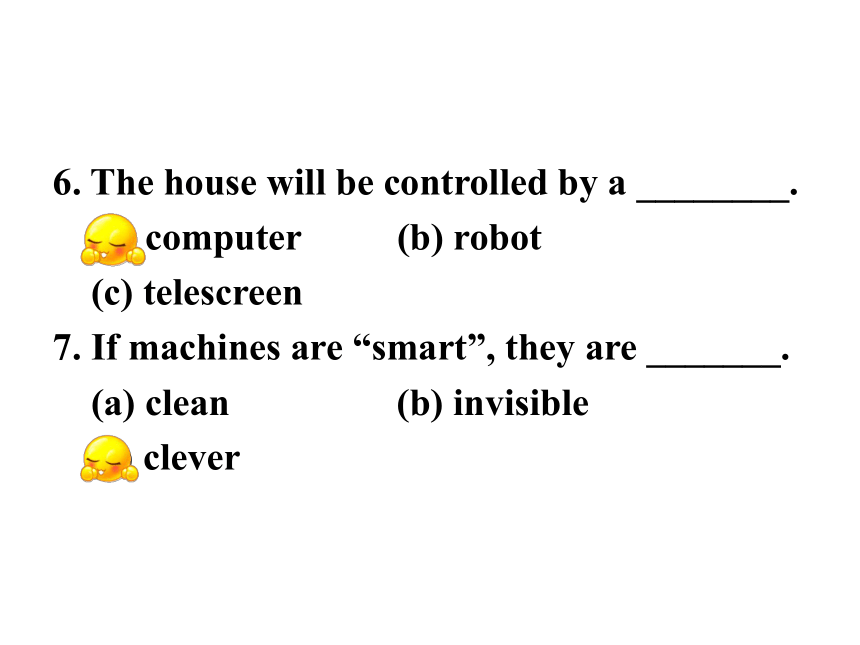
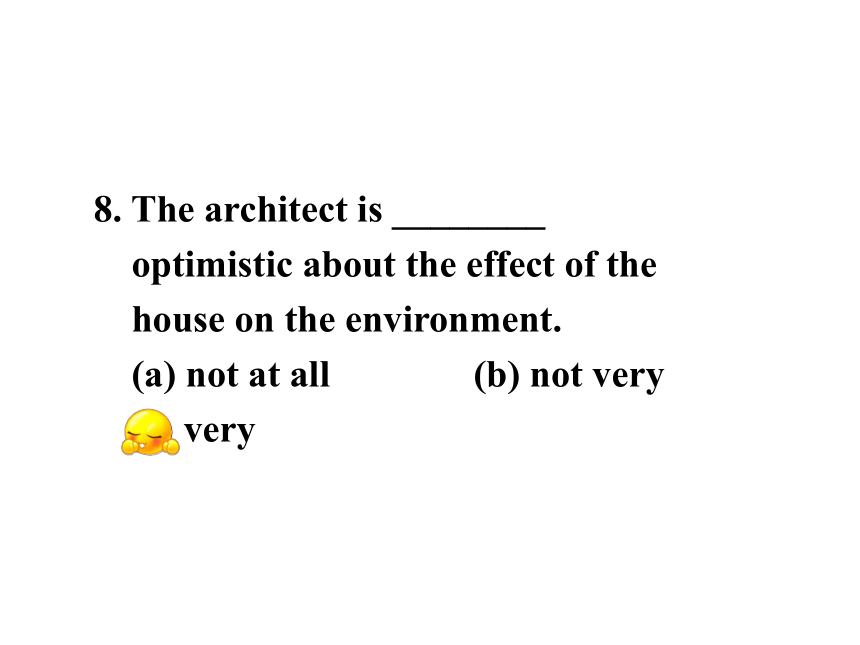
文档简介
课件26张PPT。Module 1
Life in the FutureListening and SpeakingTo listen to learn to describe the house of the future.
To learn to stress the right words in a sentence.Describe your home to your partner. Talk about these things. size and number of rooms
furniture technologyHe describes what houses will look like in _________ years’ time.
(a) twenty (b) thirty (c) fortyListen to an architect talking about the home of the future and answer the questions.2. He thinks houses in the future will be different _________.
(a) outside (b) inside
(c) outside and inside
3. Houses will have _________which move.
(a) floors (b) ceilings
(c) walls 4. The most important room will be the
_________.
(a) bathroom (b) kitchen
(c) living room
5. The _________will be bigger.
(a) bathroom
(b) dining room
(c) toilet6. The house will be controlled by a ________.
(a) computer (b) robot
(c) telescreen
7. If machines are “smart”, they are _______.
(a) clean (b) invisible
(c) clever8. The architect is ________
optimistic about the effect of the
house on the environment.
(a) not at all (b) not very
(c) veryWork in pairs and check your answers to activity 2. Now listen again.I: Good afternoon everybody and _____ the
programme this afternoon is an expert
on American ________ ___________,
Mr. Simon Oppenheim who’s going to
talk to us about the _____ ____ _____ ______.
So where shall we be living in twenty
years’ time?
G: Twenty years _______ a long time. We
won’t be living ____________ or in space.
We will be living in houses and flats just
as we do today.ondomestic architectureListen again and fill in the blanks.isn’thouse of the futureundergroundI: What will the houses look like?
G: I think they’ll look _____ _____ _____ ____
they do today, at least from the outside.
But they will be different inside.
I: _____ _____ _____?
G: ____ _____ _____, they’ll be more flexible.
That means we will be able to move the
walls to create ______ ______ _______
rooms when we want to. So the dining
room and living room as we know them
would __________.much the same asIn what wayFor a startbigger or smallerdisappearI: And the kitchen?
G: The kitchen ______ _______ the most
important room in the house! We will
_____ _____ _______, and we’ll probably
be using the kitchen more as a family
room. And bathrooms will be bigger.
I: So we _____ ____ _______ more time in the
bath.
G: Just as other people have done in the
past, like in the days of the ancient
Romans, when the bath had an important
_____ ________…will becomestill be cookingwill be spendingsocial functionI: What about furniture?
G: Well, a lot of furniture will be the
same — we _____ _____ _____ ______ in
chairs and using cupboards to keep
things in, but the technology will be
different. I think a single computer will
_________ most of the functions in the
house, and it will have a voice
recognition system.
I: So we’ll just have to say Switch on the
Light and the light ______ _____?will still be sittingcontrolcomes onG: Yes, that’s right. And the __________ will
be smarter.
I: Smarter?
G: Yes. For example, if we _____ _____ _____
something, like there’s _____ _____ milk left
in the fridge, the computer will tell us.
Maybe a shopping list would appear on a
screen on the fridge. And the toilet will
move higher or lower, _________ _____ who
uses it — a child or an adult.run out ofno moredepending ontechnologyI: Will the houses of the future be
___________ ________?
G: Yes, _________. We’ll be using machines
which use less energy. An example could
be a dishwasher which doesn’t need water.
I think everyone _____ ____ ______ _____
to take care of the environment.
I: Does that mean you’re _________ _______
the future?
G: Oh yes, very definitely.environment friendlydefinitelywill be trying hardoptimistic about1. what could happen to the dining room and the living roomWork in pairs. Try to remember what the architect says about:The computer will do it.They will disappear.2. how to switch on the lights3. what the toilet will be able to doIt will wash the dishes without water.It will move higher or lower depending on who uses it. 4. what the dishwasher will be able to doExample: I think bathrooms will get bigger. I
don’t think toilets will move!Say which things you think will happen, and which won’t happen.Work in groups. Imagine your house of the future. Think about these things.How big will it be?
What will it be made of / from?
Which rooms will be most important?
What new technology will it have?
How environment-friendly will it be? Describe the house to test of the class.Pronunciation1. Twenty years isn’t a long time. We won’t be living underground or in space. We’ll be living in houses and flats just as we do today.Underline the stressed words in this passage.Now listen and check.1. Twenty years isn’t a long time. We won’t be living underground or in space. We’ll be living in houses and flats just as we do today.Look at the stressed words. Predict what the passage says.kitchen – most important room – house
We – still – cooking, probably – using – kitchen more – family – room.
bathrooms – bigger. Now listen and check.The kitchen will become the most important room in the house! We’ll still be cooking, and we’ll probably be using the kitchen more as a family room. And bathrooms will be bigger.Describe what you will be doing in 10 years.
Life in the FutureListening and SpeakingTo listen to learn to describe the house of the future.
To learn to stress the right words in a sentence.Describe your home to your partner. Talk about these things. size and number of rooms
furniture technologyHe describes what houses will look like in _________ years’ time.
(a) twenty (b) thirty (c) fortyListen to an architect talking about the home of the future and answer the questions.2. He thinks houses in the future will be different _________.
(a) outside (b) inside
(c) outside and inside
3. Houses will have _________which move.
(a) floors (b) ceilings
(c) walls 4. The most important room will be the
_________.
(a) bathroom (b) kitchen
(c) living room
5. The _________will be bigger.
(a) bathroom
(b) dining room
(c) toilet6. The house will be controlled by a ________.
(a) computer (b) robot
(c) telescreen
7. If machines are “smart”, they are _______.
(a) clean (b) invisible
(c) clever8. The architect is ________
optimistic about the effect of the
house on the environment.
(a) not at all (b) not very
(c) veryWork in pairs and check your answers to activity 2. Now listen again.I: Good afternoon everybody and _____ the
programme this afternoon is an expert
on American ________ ___________,
Mr. Simon Oppenheim who’s going to
talk to us about the _____ ____ _____ ______.
So where shall we be living in twenty
years’ time?
G: Twenty years _______ a long time. We
won’t be living ____________ or in space.
We will be living in houses and flats just
as we do today.ondomestic architectureListen again and fill in the blanks.isn’thouse of the futureundergroundI: What will the houses look like?
G: I think they’ll look _____ _____ _____ ____
they do today, at least from the outside.
But they will be different inside.
I: _____ _____ _____?
G: ____ _____ _____, they’ll be more flexible.
That means we will be able to move the
walls to create ______ ______ _______
rooms when we want to. So the dining
room and living room as we know them
would __________.much the same asIn what wayFor a startbigger or smallerdisappearI: And the kitchen?
G: The kitchen ______ _______ the most
important room in the house! We will
_____ _____ _______, and we’ll probably
be using the kitchen more as a family
room. And bathrooms will be bigger.
I: So we _____ ____ _______ more time in the
bath.
G: Just as other people have done in the
past, like in the days of the ancient
Romans, when the bath had an important
_____ ________…will becomestill be cookingwill be spendingsocial functionI: What about furniture?
G: Well, a lot of furniture will be the
same — we _____ _____ _____ ______ in
chairs and using cupboards to keep
things in, but the technology will be
different. I think a single computer will
_________ most of the functions in the
house, and it will have a voice
recognition system.
I: So we’ll just have to say Switch on the
Light and the light ______ _____?will still be sittingcontrolcomes onG: Yes, that’s right. And the __________ will
be smarter.
I: Smarter?
G: Yes. For example, if we _____ _____ _____
something, like there’s _____ _____ milk left
in the fridge, the computer will tell us.
Maybe a shopping list would appear on a
screen on the fridge. And the toilet will
move higher or lower, _________ _____ who
uses it — a child or an adult.run out ofno moredepending ontechnologyI: Will the houses of the future be
___________ ________?
G: Yes, _________. We’ll be using machines
which use less energy. An example could
be a dishwasher which doesn’t need water.
I think everyone _____ ____ ______ _____
to take care of the environment.
I: Does that mean you’re _________ _______
the future?
G: Oh yes, very definitely.environment friendlydefinitelywill be trying hardoptimistic about1. what could happen to the dining room and the living roomWork in pairs. Try to remember what the architect says about:The computer will do it.They will disappear.2. how to switch on the lights3. what the toilet will be able to doIt will wash the dishes without water.It will move higher or lower depending on who uses it. 4. what the dishwasher will be able to doExample: I think bathrooms will get bigger. I
don’t think toilets will move!Say which things you think will happen, and which won’t happen.Work in groups. Imagine your house of the future. Think about these things.How big will it be?
What will it be made of / from?
Which rooms will be most important?
What new technology will it have?
How environment-friendly will it be? Describe the house to test of the class.Pronunciation1. Twenty years isn’t a long time. We won’t be living underground or in space. We’ll be living in houses and flats just as we do today.Underline the stressed words in this passage.Now listen and check.1. Twenty years isn’t a long time. We won’t be living underground or in space. We’ll be living in houses and flats just as we do today.Look at the stressed words. Predict what the passage says.kitchen – most important room – house
We – still – cooking, probably – using – kitchen more – family – room.
bathrooms – bigger. Now listen and check.The kitchen will become the most important room in the house! We’ll still be cooking, and we’ll probably be using the kitchen more as a family room. And bathrooms will be bigger.Describe what you will be doing in 10 years.
